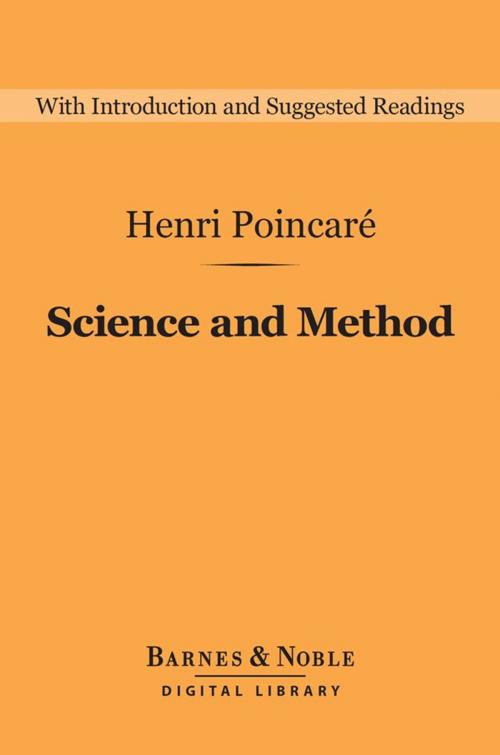| Author: | Henri Poincare | ISBN: | 9781411466715 |
| Publisher: | Barnes & Noble | Publication: | March 13, 2012 |
| Imprint: | Barnes & Noble | Language: | English |
| Author: | Henri Poincare |
| ISBN: | 9781411466715 |
| Publisher: | Barnes & Noble |
| Publication: | March 13, 2012 |
| Imprint: | Barnes & Noble |
| Language: | English |
This edition includes a modern introduction and a list of suggested further reading.
"[T]he untrammeled reflections of a broad and cultivated mind upon the procedure and the postulates of scientific discovery." - Bertrand Russell
Henri Poincaré's Science and Method (1908) was one of the most talked-about books in turn-of-the-century France, and it remains a fine example of the author's philosophical scholarship. Starting from first principles and written in Poincaré's unique and inimitable style, the book encompasses a wide variety of methodological topics in science. It also contains Poincaré's personal views on much-discussed contemporary issues such as the theory of relativity, the applicability of the calculus of probability in physics, and the foundations of mathematics. Few would disagree that it is the clarity of the exposition that makes Poincaré's writing so compelling and impressive, as it conveys even the most complex idea in a down-to-earth and unaffected manner.
Henri Poincaré's Science and Method (1908) was one of the most talked-about books in turn-of-the-century France, and it remains a fine example of the author's philosophical scholarship. Starting from first principles and written in Poincaré's unique and inimitable style, the book encompasses a wide variety of methodological topics in science. It also contains Poincaré's personal views on much-discussed contemporary issues such as the theory of relativity, the applicability of the calculus of probability in physics, and the foundations of mathematics. Few would disagree that it is the clarity of the exposition that makes Poincaré's writing so compelling and impressive, as it conveys even the most complex idea in a down-to-earth and unaffected manner.
This edition includes a modern introduction and a list of suggested further reading.
"[T]he untrammeled reflections of a broad and cultivated mind upon the procedure and the postulates of scientific discovery." - Bertrand Russell
Henri Poincaré's Science and Method (1908) was one of the most talked-about books in turn-of-the-century France, and it remains a fine example of the author's philosophical scholarship. Starting from first principles and written in Poincaré's unique and inimitable style, the book encompasses a wide variety of methodological topics in science. It also contains Poincaré's personal views on much-discussed contemporary issues such as the theory of relativity, the applicability of the calculus of probability in physics, and the foundations of mathematics. Few would disagree that it is the clarity of the exposition that makes Poincaré's writing so compelling and impressive, as it conveys even the most complex idea in a down-to-earth and unaffected manner.
Henri Poincaré's Science and Method (1908) was one of the most talked-about books in turn-of-the-century France, and it remains a fine example of the author's philosophical scholarship. Starting from first principles and written in Poincaré's unique and inimitable style, the book encompasses a wide variety of methodological topics in science. It also contains Poincaré's personal views on much-discussed contemporary issues such as the theory of relativity, the applicability of the calculus of probability in physics, and the foundations of mathematics. Few would disagree that it is the clarity of the exposition that makes Poincaré's writing so compelling and impressive, as it conveys even the most complex idea in a down-to-earth and unaffected manner.















